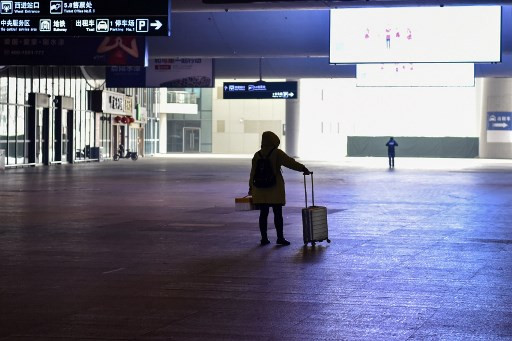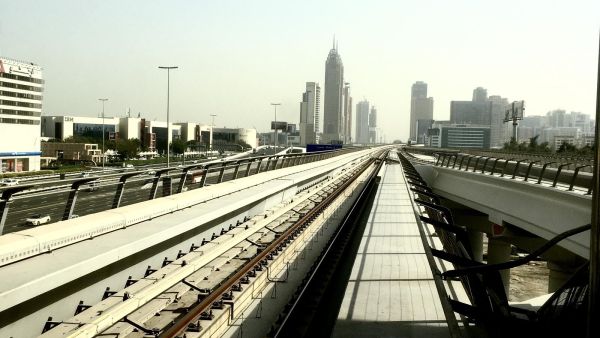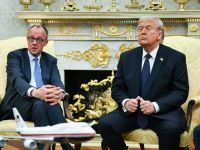I’ve been taking the Dubai metro to work for the past couple of weeks, from an Airbnb based in Mirdif. It’s a forty-five minute overground journey that spans the length of the city.
The metro journey begins by passing the main terminals of Dubai’s glittering airport. Vast Airbus A380’s standby on tarmac. Others heave themself upwards into the sky, massive giants, seemingly defying the laws of physics. As the metro progresses, it enters the center of the city. The sky folds into arching skyscrapers and spaghetti junctions. Traffic races across superhighways. The Dubai metro is a front-row seat into the forces of globalization and ingenuity reshaping our time.
For the past week, the journey has been different. I’ve been wearing a black N95 face-mask and reflexively cleaning everything
For the past week, the journey has been different. I’ve been wearing a black N95 face-mask and reflexively cleaning everything - my hands, the seat in front, everything - with hand sanitizer. Earlier this week I sneezed quietly into my elbow on the metro: too much air conditioning from the night before. Everybody noticed. There were far fewer planes in the sky. I saw A380s lined up silently on tarmac, sad and vulnerable.
As the metro wove its way closer to work, the scale of what was happening became visible. Dubai’s frenetic highways were almost empty. Not a person was in sight. The metro carriage was silent.
For the past week, the journey has been different. I’ve been wearing a black N95 face-mask and reflexively cleaning everything - my hands, the seat in front, everything - with hand sanitizer.
In the space of a couple of weeks, the COVID-19 virus has brought much of modern civilization to a standstill. In France, family members have printed out official government papers to apply for permission to leave the house. In the UK, food is being ordered online. Parents are fearful for the health of their children and the future of the economy.
In Jordan, the country has instituted a light-handed but firmly communicated form of martial law. Amman, the capital, is a sociable and incredibly tightly-knit community. Social media in the country is a mix of practical, anxious and good humored.
One of our writers in Washington wrote of how the ‘hustle and anxiety’ of American life looks so small in retrospect. In London, an American writer is stuck in the city after failing to find a flight home. Friends in the Middle East have found themselves returning to the cities of their birth, simply because nowhere else is accessible. An Italian writer presaged much of this earlier in the year, writing her experience of early-quarantine in Rome and Madrid here.
We live in a globalized world, but for all of us it is the local and the familial that comes first; the ride to work, the whatsapp message or Skype call to check-in on our loved ones. It’s precisely here, on this most intimate of levels, that the COVID-19 virus has struck. It has bypassed governments, health systems and the post-World War II system of nation-states. Suddenly, the modern world looks fragile.
We live in a globalized world, but for all of us it is the local and the familial that comes first; the ride to work, the whatsapp message or Skype call to check-in on our loved ones. It’s precisely here, on this most intimate of levels, that the COVID-19 virus has struck
There have been epoch altering pandemics in the past. From the bubonic plague, to the pathogens brought into the New World by Spanish settlers in the sixteen century, to the footnotes in extant ancient Persian or Egyptian records of regions decimated by an unknown disease. History is littered with the passing shadow of great viruses. Yet none have been as global as the Coronavirus. The COVID-19 virus is the first global pandemic.
Our world is changing as a result.
China, Globalization and the Digital Economy

Wuhan province train station, China on Jan 23rd, 2020. /AFP
The importance of nation-states will diminish. While conservatives in the United States and United Kingdom have pointed to the importance of borders and national health systems, COVID-19 has illustrated the extent to which human civilization is already globalized and cross-border. This is not an ideological argument. It is a recognition of reality. The challenge will be for global institutions to become far more participatory, democratic and transparent; something that our editorial teams have written on at length in the past.
Secondly, the year 2020 will be the year of the digital economy. Billions of people are today connecting over VOIP services to re-order their professional lives. As an entire generation in the UK and Europe effectively have their education put on hold, institutions are scrambling to provide digital e-learning services.
Developing parts of the world will also move to adopting these services quickly. A hybrid model of education which combines digital learning with affiliation to a physical college or institution is emerging.
Through the impact of Coronavirus, a new global consciousness is being born.
Finally, it is becoming clear that the defining geopolitical relationship of our generation will be between the western world and China, just as it was between the United States and Russia during the Cold War. This is not because a strain of the COVID-19 originated in Wuhan province, mainland China. Rather, it is because billions of individuals on Earth are now aware of how proximate and connected to China we have become.
Through the impact of Coronavirus, a new global consciousness is being born. The result is that global questions formerly the preserve of a diplomatic and corporate elite will now be considered of critical concern to domestic and national populations.
billions of individuals on Earth are now aware of how proximate and connected to China we have now all become.
Unless it can help to triangulate a new relationship between the western world and China, the Middle East will diminish in importance for the UK and Europe. In the United States this transition will also take place, but it will be slower and harder-fought.
Of course on the larger scale of things, these tectonic shifts are of little concern. What’s really important is washing your hands, staying healthy, and waiting for a time when A380’s will once again fly over Mirdif.
The views expressed in this article do not necessarily reflect those of Al Bawaba News.







